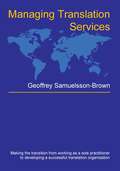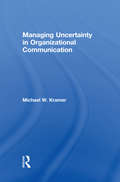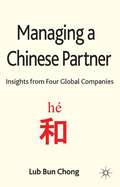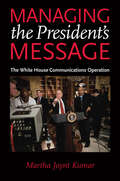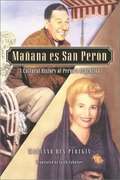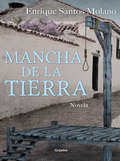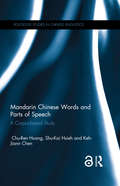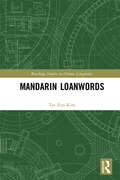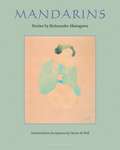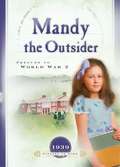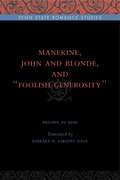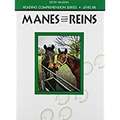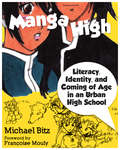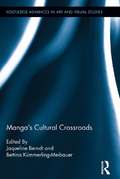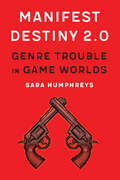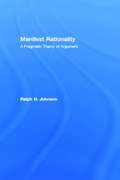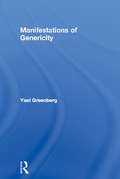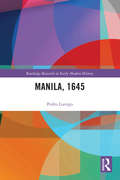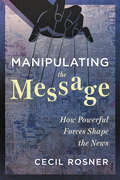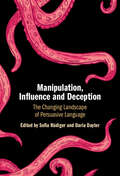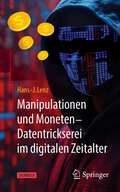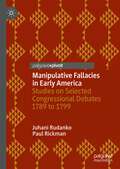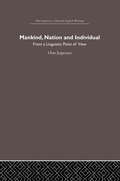- Table View
- List View
Managing Translation Services
by Geoffrey Samuelsson-BrownThe book is intended principally for those who presently work as a freelance translator with all the inherent limitations this presents in terms of income and being reliant on the limited range of skills that the individual can offer. While some business skills will have been accumulated by virtue of working in a commercial environment, the transition from being responsible for oneself and taking the bold step of employing additional resources can be quite daunting. However, the opportunities this offers in terms of income and personal satisfaction are considerable. This book considers the initial Ssteps towards business development, exploiting these opportunities and the rewards they can offer.
Managing Uncertainty in Organizational Communication (Routledge Communication Series)
by Michael W. KramerIn this book, Michael W. Kramer applies uncertainty reduction theory (URT)--a key theory in current communication scholarship--to the context of organizational communication. Examining URT and the range of research applicable to organizational settings, Kramer proposes a groundbreaking theory of managing uncertainty (TMU), which synthesizes prior research while also addressing its criticisms. Examples are provided to illustrate the principles of the TMU at both the individual and collective (group/organizational) levels of analysis. Original studies based on the theory show that it provides a useful extension of URT, addressing some concerns raised by critics of that earlier model. Kramer illustrates that, as a model in progress, TMU will change as new research and insights build upon it. Managing Uncertainty in Organizational Communication assists readers in understanding and researching uncertainty in communication, which encourages additional changes and improvements to the model. It is of primary interest to scholars, researchers, and practitioners in organizational, interpersonal, and group communication.
Managing a Chinese Partner
by Lub Bun ChongFrom 2007 to 2009, French food and beverage giant Danone and Chinese entrepreneur Zong Qinghou who is ranked number one on Forbes' China Rich List 2012 were embroiled in a highly rancorous dispute over their joint venture, Hangzhou Wahaha. It transpired that even French President Sarkozy reportedly found time in his 2007 three-day state visit to China to discuss the 'Wahaha' dispute with his Chinese counterpart, President Hu. Behind the melodrama of the 'Wahaha' dispute lies an important lesson for foreign companies in China. As a result of the global shift in power, the imperative for a foreign company to manage its Chinese Partner has never been stronger since China re-opened its doors for business in 1978. By drawing on the experiences of Danone, Nestle, Coca-Cola and SABMiller, this book provides an insight into why, as well as, how the managing of a Chinese Partner can deliver sustainable value for a joint venture in China. "
Managing the President's Message: The White House Communications Operation
by Martha Joynt KumarWinner, 2008 Richard E. Neustadt Award, Presidency Research Group organized section of the American Political Science AssociationPolitical scientists are rarely able to study presidents from inside the White House while presidents are governing, campaigning, and delivering thousands of speeches. It’s even rarer to find one who manages to get officials such as political adviser Karl Rove or presidential counselor Dan Bartlett to discuss their strategies while those strategies are under construction. But that is exactly what Martha Joynt Kumar pulls off in her fascinating new book, which draws on her first-hand reporting, interviewing, and original scholarship to produce analyses of the media and communications operations of the past four administrations, including chapters on George W. Bush and Bill Clinton. Kumar describes how today’s White House communications and media operations can be at once in flux and remarkably stable over time. She describes how the presidential Press Office that was once manned by a single presidential advisor evolved into a multilayered communications machine that employs hundreds of people, what modern presidents seek to accomplish through their operations, and how presidents measure what they get for their considerable efforts.Laced throughout with in-depth statistics, historical insights, and you-are-there interviews with key White House staffers and journalists, this indispensable and comprehensive dissection of presidential communications operations will be key reading for scholars of the White House researching the presidency, political communications, journalism, and any other discipline where how and when one speaks is at least as important as what one says.
Manana Es San Peron: A Cultural History of Peron's Argentina
by Mariano Ben PlotkinThe regime of Juan Peron is one of the most studied topics of Argentina's contemporary history. This new book - an English translation of a highly popular, critically acclaimed Spanish language edition- provides a new perspective on the intriguing Argentinian leader. Mariano Plotkin's cultural approach makes Peron's popularity understandable because it goes beyond Peron's charismatic appeal and analyzes the Peronist mechanisms used to generate political consent and mass mobilization. Manana es San Peron is the first book to focus on the cultural and symbolic dimensions of Peronism and populism. Plotkin also presents important material for the study of populism and the modern state in this region. Manana es San Peron explores the creation of myths, symbols, and rituals which constituted the Peronist political imagery. This political imagery was not designed to reinforce the legitimacy of a political system defined in abstract terms, but to assure the undisputed loyalty of different sectors of society to the Peronist government and to Peron himself. The evolution of the institutional framework that made the creation of this symbolic apparatus possible is also discussed. This well-researched book shows the methods designed by the Peronist regime to broaden its social base through the incorporation and activation of groups which had traditionally occupied a marginalized position within the political system-non-union workers, women, and the poor. Plotkin investigates how Peron used the education system to build his popularity. He examines the public assistance programs financed through the Eva Peron Foundation, and demonstrates how they were used to politicize women for the first time. He explains how Eva Peron and the Peronist regime not only tried to gain the support of women as voters but also as potential 'missionaries' who would spread the Peronist word in the privacy of their homes. This well-written and engaging account of one of Latin America's most colorful and appealing leaders is an excellent resource on Argentina and Latin American history and politics.
Mancha de la tierra
by Enrique Santos"Mancha de la tierra es una novela prodigiosa, una joya. Avanza como unasuperproducción de las que hacen los ingleses con los gringos, BBC conHBO, y que hoy envician a cualquiera, pero lo consigue palabra porpalabra, y así es que narra una época y una sociedad, y recrea unahumanidad y una nobleza que parecen de mentira y que al ?nal lo dejan auno devastado porque fueron verdad. También es un libro de historia, unpoema épico, un álbum de fotos y las memorias de un hombre bueno. Y asírestaura uno de esos momentos fundamentales de la historia de Colombia#quizás el más# en los que se reunieron los mejores a conspirar en vano.Es una joya, digo, porque todo el tiempo quiere uno saber qué va aocurrir: y va a ocurrir este país. Es conmovedor, contundente y sabioeste libro, fascinante y estremecedor al mismo tiempo, porque estácargado del humor y el amor y la ternura que son la marca de estilo deEnrique Santos Molano". Ricardo Silva Romero
Mandarin Chinese Words and Parts of Speech: A Corpus-based Study (Routledge Studies in Chinese Linguistics)
by Chu-Ren Huang Shu-Kai Hsieh Keh-Jiann ChenThis monograph is a translation of two seminal works on corpus-based studies of Mandarin Chinese words and parts of speech. The original books were published as two pioneering technical reports by Chinese Knowledge and Information Processing group (CKIP) at Academia Sinica in 1993 and 1996, respectively. Since then, the standard and PoS tagset proposed in the CKIP report have become the de facto standard in Chinese corpora and computational linguistics, in particular in the context of traditional Chinese texts. This new translation represents and develops the principles and theories originating from these pioneering works. The results can be applied to numerous fields; Chinese syntax and semantics, lexicography, machine translation and other language engineering bound applications. Suitable for graduate and scholars in the fields of linguistics and Chinese, Mandarin Chinese Words and Parts of Speech provides a comprehensive survey of the issues around wordhood and PoS.
Mandarin Loanwords (Routledge Studies in Chinese Linguistics)
by Tae Eun KimEnglish-based Mandarin loanwords are commonly used in Chinese people’s daily lives. Mandarin Loanwords demonstrates how English phonemes map into Mandarin phonemes through Mandarin loanwords adaptation. The consonantal adaptations are the most important in the analyses, and vowel adaptation and tonal adaptation is also considered. Through the analysis, it is proven that the functions of phonology and phonetics play a significant role in Mandarin loanword adaptation, however the functions of other factors, such as semantic functions of Chinese characters and English orthography, are also discussed. Additionally, the phonetic symbolization of Chinese characters is mentioned.
Mandarins: Stories by Ryunosuke Akutagawa
by Ryunosuke Akutagawa Charles DewolfPrefiguring the vital modernist voices of the Western literary canon, Akutagawa writes with a trenchant psychological precision that exposes the shifting traditions and ironies of early twentieth-century Japan and reveals his own strained connection to it. These stories are moving glimpses into a cast of characters at odds with the society around them, singular portraits that soar effortlessly toward the universal. "What good is intelligence if you cannot discover a useful melancholy?" Akutagawa once mused. Both piercing intelligence and "useful melancholy" buoy this remarkable collection. Mandarins contains three stories published in English for the first time: "An Evening Conversation," "An Enlightened Husband," and "Winter."
Mandy the Outsider: Prelude to World War 2
by Norma Jean LutzTen-year old Mandy McMichael doesn't fit in at her new school in Seattle. She's very smart, but the "in crowd" teases her so much she decides to play dumb to quiet their taunts. Then there's her friendship with a Japanese family--and in 1939, with the world on the brink of war, hers is not a popular position. Using actual historical events to tell a compelling fictional story, Mandy the Outsider is a poignant tale of a girl balancing her desire for acceptance with her need to do right, and to be who God wants her to be.
Manekine, John and Blonde, and “Foolish Generosity” (Penn State Romance Studies #9)
by Barbara N. Sargent-Baur Philippe De RemiPhilippe de Remi (1200/1210–65) holds a remarkable position in the legacy of the thirteenth-century literary world. A layman, landholder, and professional administrator, rather than a court poet or member of the clergy, Philippe de Remi wrote poems, songs, and long verse narratives that were grounded in his familiarity with the literary genres of his day. While Philippe paid homage to Chrétien de Troyes and other important secular writers of the period, his station in society and an intended audience of family and friends, not patrons, allowed him the freedom to treat courtly conventions with some independence and to explore human motivations across the social spectrum. Barbara Sargent-Baur brings to the modern English-speaking reader a translation of three of Philippe’s most important compositions: his two verse romances, Manekine and John and Blonde, as well as his single short verse tale, “Foolish Generosity.” This volume gathers the first English stand-alone prose translations of these romances, which have been previously published only as line-by-line versions facing the Old French originals. Sargent-Baur’s English translation of “Foolish Generosity” is the first rendering from Old French in any language. These important translations allow increased access to Philippe de Remi’s attractive narrative works, expanding their audience beyond an Old French readership to the wider academic community.
Manes and Reins
by Raintree Steck-Vaughn StaffA second grade workbook to aid the students as they learn how to read and answer comprehension questions.
Manga High: Literacy, Identity, and Coming of Age in an Urban High School
by Michael BitzBased on a four-year study, Manga High explores the convergence of literacy, creativity, social development, and personal identity in one of New York City&’s largest high schools. Since 2004, students at Martin Luther King, Jr., High School in Manhattan have been creating manga—Japanese comic books. They write the stories, design the characters, and publish their works in print and on the Internet. These students—African-American and Latino teenagers—are more than interested in the art and medium of manga. They have become completely engrossed in Japanese language, culture, and society.Manga High is highlighted by reproductions and content analysis of students&’ original art and writing. An appendix includes guidelines for educators on starting a comic book club.
Manga's Cultural Crossroads: Manga's Cultural Crossroads (Routledge Advances in Art and Visual Studies #5)
by Jaqueline Berndt Bettina Kümmerling-MeibauerFocusing on the art and literary form of manga, this volume examines the intercultural exchanges that have shaped manga during the twentieth century and how manga’s culturalization is related to its globalization. Through contributions from leading scholars in the fields of comics and Japanese culture, it describes "manga culture" in two ways: as a fundamentally hybrid culture comprised of both subcultures and transcultures, and as an aesthetic culture which has eluded modernist notions of art, originality, and authorship. The latter is demonstrated in a special focus on the best-selling manga franchise, NARUTO.
Manifest Destiny 2.0: Genre Trouble in Game Worlds (Postwestern Horizons)
by Sara HumphreysAt a time when print and film have shown the classic Western and noir genres to be racist, heteronormative, and neocolonial, Sara Humphreys&’s Manifest Destiny 2.0 asks why these genres endure so prolifically in the video game market. While video games provide a radically new and exciting medium for storytelling, most game narratives do not offer fresh ways of understanding the world. Video games with complex storylines are based on enduring American literary genres that disseminate problematic ideologies, quelling cultural anxieties over economic, racial, and gender inequality through the institutional acceptance and performance of Anglo cultural, racial, and economic superiority. Although game critics and scholars recognize how genres structure games and gameplay, the concept of genre continues to be viewed as a largely invisible power, subordinate to the computational processes of programming, graphics, and the making of a multimillion-dollar best seller. Investigating the social and cultural implications of the Western and noir genres in video games through two case studies—the best-selling games Red Dead Redemption (2010) and L.A. Noire (2011)—Humphreys demonstrates how the frontier myth continues to circulate exceptionalist versions of the United States. Video games spread the neoliberal and neocolonial ideologies of the genres even as they create a new form of performative literacy that intensifies the genres well beyond their originating historical contexts. Manifest Destiny 2.0 joins the growing body of scholarship dedicated to the historical, theoretical, critical, and cultural analysis of video games.
Manifest Rationality: A Pragmatic Theory of Argument
by Ralph H. JohnsonThis book works through some of the theoretical issues that have been accumulating in informal logic over the past 20 years. At the same time, it defines a core position in the theory of argument in which those issues can be further explored. The underlying concern that motivates this work is the health of practice of argumentation as an important cultural artifact. A further concern is for logic as a discipline. Argumentative and dialectical in nature, this book presupposes some awareness of the theory of argument in recent history, and some familiarity with the positions that have been advanced. It will be of interest to academics, researchers, and advanced undergraduate and graduate students in the disciplines of logic, rhetoric, linguistics, speech communication, English composition, and psychology.
Manifestations of Genericity (Outstanding Dissertations in Linguistics)
by Yael GreenbergIn this book, Yael Greenberg discusses and clarifies a number of controversial issues and phenomena in the generic literature, including the existence of "episodic genericity," existential presuppositions, and contextual restrictions of generics.
Manila, 1645
by Pedro LuengoManila, 1645 reconstructs what the city of Manila was like before the earthquakes of the mid-seventeenth century. The book demonstrates the importance of addressing the history of Southeast Asia as a multi-layered framework, rather than a series of entangled histories. In doing so, Manila is contextualized not merely as a Spanish settlement connected to New Spain via America, but instead within Southeast Asia, situated between the Chinese and the Sulú Seas, and located in the centre of commercial routes used by Armenian, Dutch, and Portuguese traders. This historical and geographical context is crucial to understanding later cultural dialogues. Urban planning, housing and architecture, and social networks in the city are also examined. The book will appeal to students and scholars interested in early modern history, global history and architectural history.
Manimahesh
by Umaprasada Mukhopadhyaya Sanjukta DasguptaLife and works of Bengali poet Umaprasad Mukhopadhyay. An Akademi award-winning Bengali travelogue.
Manipulating the Message: How Powerful Forces Shape the News
by Cecil RosnerJournalists hate the term fake news, but there’s a troubling reality: spin doctors routinely try to dupe them into reporting misleading and distorted stories.Check the news on any given day and here’s what you’ll find: Governments routinely lie. Companies inflate claims about their products and practices. Institutions release studies with misleading data meant to deceive. Police departments, infected by systemic racism, downplay crimes against Indigenous and racialized people.The public depends on the media to help them understand the world, but are journalists catching all the daily lies, omissions, and distortions? Shrinking newsrooms and an army of spin doctors mean journalists can get duped. Despite valiant efforts by a handful of investigative journalists, the truth is routinely left behind.Award-winning journalist Cecil Rosner insists there is something we can do about this. We can pressure news organizations to stop blindly regurgitating the firehose of press releases and focus instead on determining what is actually true. Rosner empowers readers by sharing his techniques for detecting misinformation and disinformation.
Manipulation, Influence and Deception: The Changing Landscape of Persuasive Language
by Daria Dayter Sofia RüdigerIn an era characterised by information saturation and the rapid evolution of digital communication platforms, the study of persuasive language is undergoing profound developments. Bringing together cutting-edge research from a team of internationally acclaimed experts, this timely book examines the transformations occurring in the domain of persuasive language in contemporary society. It dissects the intricate web of manipulation, influence and deception, providing in-depth analyses of the potent mechanisms governing communication. Each chapter offers empirical insights from a range of different scholarly perspectives, including corpus linguistics, conversation analysis, forensic linguistics, pragmatics, discourse analysis, phonetics and human-robot interactions. It opens with a comprehensive introductory chapter, making the research accessible to readers without extensive background knowledge. Equipping readers with the tools to critically engage with the multifaceted dynamics of language and persuasion, this is an indispensable resource for anyone striving to fathom the evolving realm of persuasive language.
Manipulationen und Moneten – Datentrickserei im digitalen Zeitalter
by Hans-J. LenzSchummeln ist neben Schwindeln mit Sicherheit Teil menschlichen Lebens. Es fängt schon im Kindergarten an mit Klauen von Spielsachen oder von Süßigkeiten. In der Schule wird abgeschrieben oder es werden Spicker benutzt. In der Berufswelt eröffnet die digitale Welt neue Möglichkeiten und berührt alle Lebensbereiche. Datenbetrug zielt auf geldliche Vorteile und Prestige ab oder wird vom Hass getrieben. Seine gesamte Breite wird sachlich vorgestellt und begründet, jedoch so, dass in vielen Fällen noch Schmunzeln über Einfallsreichtum und Tricksereien der Datenbetrüger möglich ist.Der Begriff Datenbetrug ist umfassend und reicht von A (Arzt im Profisport) bis Z (Zocken beim Fußball). Er ist nicht ausschließlich juristisch zu sehen, sondern ist ein gesellschaftlich-wirtschaftliches Phänomen jeder zivilisierten Gesellschaft. Die digitale Welt mit ihren virtuellen Räumen eröffnet allen Unredlichen künftig ganz neue, beängstigende Perspektiven.
Manipulative Fallacies in Early America: Studies on Selected Congressional Debates 1789 to 1799
by Juhani Rudanko Paul RickmanThis book implements a new approach to the study of manipulative tactics in selected Congressional debates in the early history of the United States, highlighting the ways in which language can be used to manipulate an audience. The identification and analysis of different informal fallacies is central in the approach adopted by the authors, and they privilege the role of covert intentions as a frequent ingredient of manipulation. They also show how different speakers can use different subtypes of the same fallacy in a debate, and investigate the tension between the policy preferences and goals of politicians, and existing laws. The book has been written without jargon, all concepts and terminology from the field of linguistic pragmatics are clearly defined, and it is accessible to the interested layperson wishing to become familiar with manipulative techniques in political rhetoric.
Mankind, Nation and Individual
by Otto JespersenThis book was first published in 1947, Mankind, Nation and Individual is a valuable contribution to the field of English Language and Linguistics.
